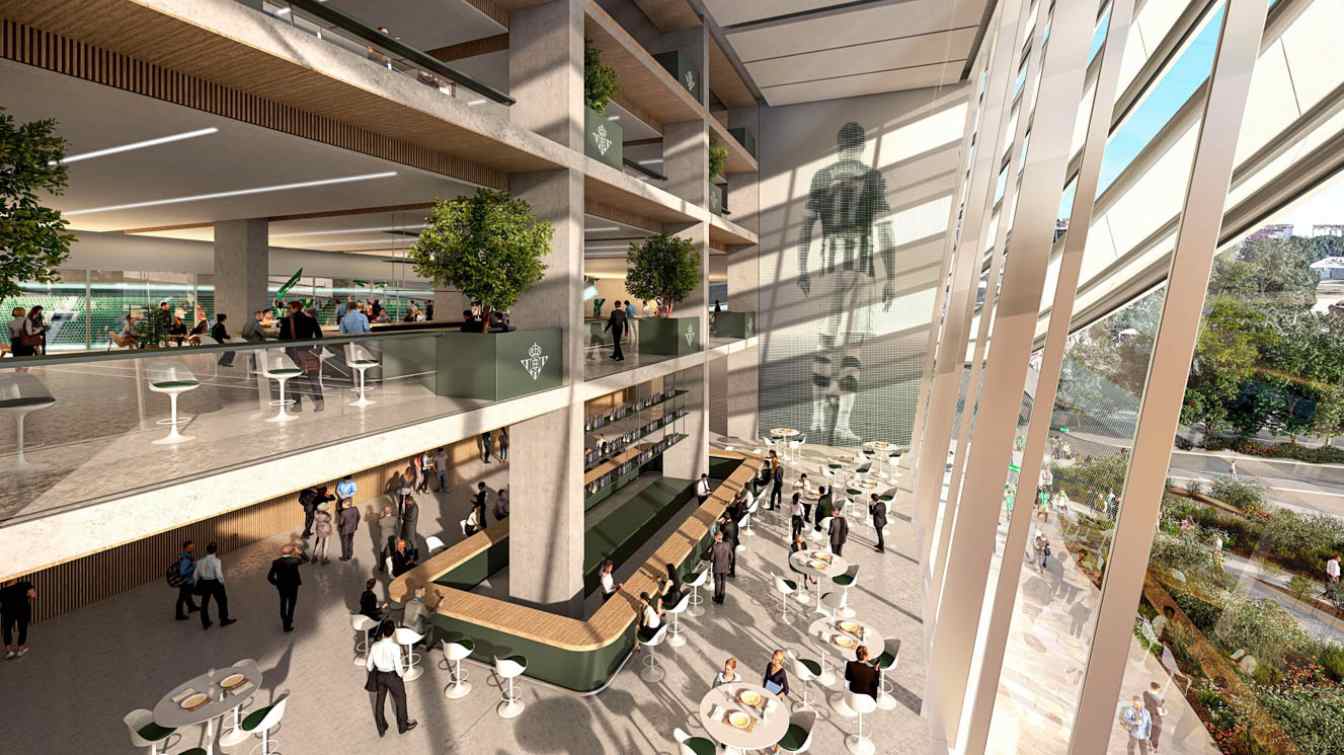Spain: Benito Villamarín redevelopment overshadowed by residents' concerns
source: StadiumDB.com; author: Jakub Ducki
 Real Betis are preparing to redevelop the Benito Villamarín, while also sparking controversy over the safety of the facility and expansion plans. While the club is probing fans' opinions on the new facilities, residents of Heliópolis are raising their voices over potential threats.
Real Betis are preparing to redevelop the Benito Villamarín, while also sparking controversy over the safety of the facility and expansion plans. While the club is probing fans' opinions on the new facilities, residents of Heliópolis are raising their voices over potential threats.
Advertisement
Modern zones at Benito Villamarín
The vision for the future of Benito Villamarín is a project that combines modernity, convenience and increased revenue for the club. Real Betis plans to create a space that will become a prestigious venue. The club has presented its members with concepts for exclusive VIP areas to raise the standards of the facility. One of the most interesting proposals is Club Terraza, a space combining live music, football and a social atmosphere overlooking the pitch. Another offering, the Tunnel Club, allows fans to get a sneak peek at the players as they make their way from the changing rooms to the pitch, as well as enjoying premium dining and access to private lounges.
For the most discerning fans, there is the Private Box, luxury suites with air conditioning that offer maximum comfort and exclusivity. The Palco Loge, on the other hand, has been designed for companies that want to combine a relaxing atmosphere with business networking opportunities.
The planned zones will transform the stadium into an active venue outside match days. Among other things, the club is considering opening a new shop, a museum and organising cultural events, which will increase revenue from the venue and make it a centre for community life.
Concerns of residents in Heliopolis area
Although the vision to modernise the stadium sounds impressive, it also raises controversy. Neighbourhood associations in the Heliópolis area are expressing concern about the expansion plans, especially the construction of a 31,500 m² building up to 47 metres high. According to residents, the new developments could significantly reduce the security level of the stadium, making access and evacuation during sporting events more difficult.
In July 2024, six residents' associations sent a letter to the Seville authorities objecting to the planned development of the neighbouring plot by Betis. The letter highlighted that the project could violate the Saint-Dennis Convention and FIFA's recommendations on stadium safety, and accused the local authorities of putting commercial interests before public safety.
Conference on stadium safety
Responding to the growing concerns of local residents is a conference entitled Safety in football stadiums: the case of the Heliópolis stadium,
held on Thursday 28 November at the Instituto de Educación Secundaria (IES) Heliópolis. The meeting was chaired by Fernando Andrés Pérez, a renowned architect, doctor of physical activity and sport sciences and expert in the design of sports facilities.
Pérez, author of designs for stadiums such as Nuevo Los Cármenes
in Granada and Nuevo Vivero
in Badajoz, has extensive experience in the creation and modernisation of sports facilities. He was co-author of the White Paper for Barcelona's bid for the 1992 Olympic Games and was an adviser to the Senate in the drafting of legislation on the prevention of violence in sport.
Fernando Andrés Pérez, gave a conference in Seville on the public debate related to the planned redevelopment project of the Benito Villamarín and the construction of an adjacent building 47 metres high, which would serve as a hotel and a health, sports and leisure centre. The event was organised by several local neighbourhood associations, which expressed their concern about the impact of the project.
During the conference, Pérez discussed key issues related to the safety of the design of large sports facilities, and also addressed specific concerns about the Betis project. The expert pointed out that the development of the last available space in the vicinity of the stadium to pursue commercial interests is controversial, especially as the plot is public. He also highlighted the difficulties of soundproofing and separating access to the stadium from the planned new facilities. Associations attending the event supported these comments, pointing out the negative impact of the project on the quality of life of residents and the urban space.
Advertisement
 StadiumDB
StadiumDB

